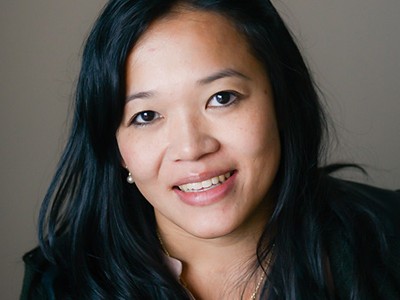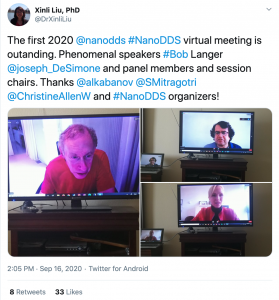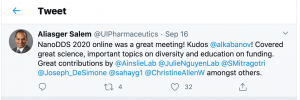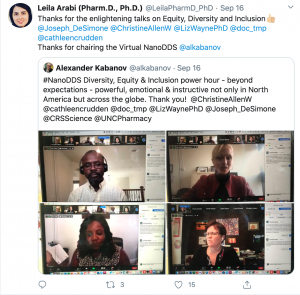September 28, 2020
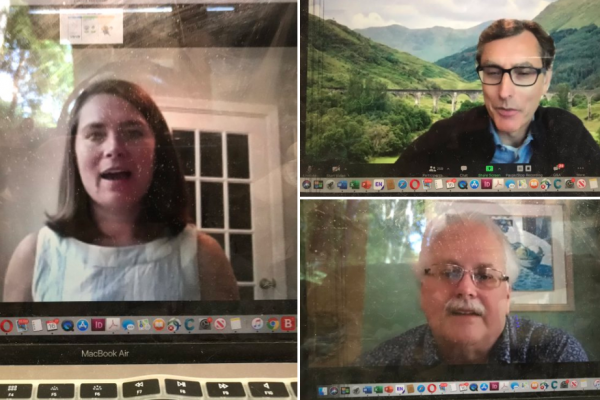
The Carolina Nanoformulation Workshop and the Nanomedicine Drug Delivery Symposium (NanoDDS) combined to host the 2020 Virtual Carolina Nanoformulation Workshop & Nanomedicine Drug Delivery Symposium on September 14-16, 2020.
BUILDING ON AN 18-YEAR LEGACY
The one-day virtual NanoDDS symposium welcomed more than 800 registered participants, the largest turnout in the past 18 years, said Alexander “Sasha” Kabanov, director of the UNC Center for Nanotechnology in Drug Delivery, which supported the event. Nearly 400 people in various time zones across the world attended NanoDDS live. Other registrants who could not attend because of time differences of the live meeting will receive access to the symposium lecture recordings.
“NanoDDS symposium series began in January 2003 in Omaha, Nebraska as a Joint US-Japan mini-symposium attended by less than 40 scientists. At the time it was, perhaps, the very first nanomedicine meeting in our county,” said Kabanov, who initiated the first meeting with Kazunori Kataoka, Ph.D., professor at University of Tokyo; and Tatiana Bronich, Ph.D., professor and associate dean for research at the College of Pharmacy, University of Nebraska Medical Center.
Kabanov said NanoDDS has grown into an influential international symposium — the key annual event for researchers developing next-generation delivery vehicles — to make diagnostics more sensitive and drugs more effective. Since 2003, the symposium has been held in various locations across North America and has attracted a combined more than 4,000 participants from over 30 countries.
SCIENTIFIC EXCELLENCE
This year’s symposium featured topics of cancer immunotherapy; tumor delivery; nanoformulation characterization; promoting diversity; research funding; and vaccines and therapeutics for COVID-19.
Among the plenary speakers were Robert Langer, Ph.D., of the Massachusetts Institute for Technology; Joseph M. DeSimone, Ph.D. of the Stanford University; and Ralph Baric, Ph.D. of the UNC Gillings School of Global Public Health.
The most recent advances on COVID-19 vaccine and therapeutics were discussed by leaders from industry, including: Kimberly Hassett, Ph.D., a Senior Scientist, Formulation Science, at Moderna Therapeutics, MA; and Tomas Cihlar, Ph.D., a Vice President of Virology at Gilead Sciences, CA.
SUPPORTING DIVERSITY AND EQUITY
The highlights of the symposium were the two “power hours” – round table discussions on diversity and equity, and funding in nanomedicine research. One of the panelists during the diversity power hour Christine Allen, Ph.D., a Professor of Pharmacy and Associate Vice-President and Vice-Provost, Strategic Initiatives at the University of Toronto, said: “It meant so much to me to be part of this session and I really appreciated everyone sharing so openly.”
Elizabeth Wayne, Ph.D., Assistant Professor of Chemical Engineering and Biomedical Engineering at Carnegie Mellon University, who also spoke on the panel adds, “I am honored to have shared this moment with all of you. Being able to discuss our contributions and what we would like to develop in our field was beautiful and powerful.” Prior to her current appointment, Wayne was the first Postdoctoral Fellow in the NIH-funded “UNC Cancer Nanotechnology T32 Training Program,” led by Kabanov.
The UNC Center for Drug Delivery and Nanomedicine made registration for the NanoDDS free for all participants and offered free registration in the Carolina Nanoformulation Workshop to students and postdocs from underrepresented minority groups.
“Almost 10% of attendees were persons from groups underrepresented in nanomedicine and this was after advertising free registration for the workshop for only a month,” said Tyrone Porter, Ph.D., Professor of Biomedical Engineering at the University of Texas at Austin, a strong advocate for diversity and equity in academia.
CAROLINA NANOFORMULATION WORKSHOP
The two-day Carolina Nanoformulation Workshop that preceded NanoDDS featured presentations on cancer immunotherapy, development of COVID-19 vaccines, nanomedicines pharmacokinetics, manufacturing, characterization and clinical translation. The workshop featured lectures from experts in industry, the US National Characterization Laboratory and UNC-Chapel.
The workshop brings together scientists from industry, government and academia to discuss key matters of translating nanomedicine technologies to practical use to improve human health. The workshop provides ample time for discussion and brainstorming and includes graduate students and postdocs.
This is the fourth event organized by the UNC Center for Nanotechnology in Drug Delivery since 2016.
Because of the pandemic, this year both the Carolina Nanoformulation Workshop and the NanoDDS were combined together and held as virtual events.
“It turned out to be a huge success. It has been very important to continue on despite COVID-19 and bring the newest advances in our science to hundreds of participants across the world. We have very positive feedback from many participants,” Kabanov said.
Learn more from participants who took to Twitter to share their thoughts on the meeting:
Latest News

RASP poster presentations capture student research

Delesha Carpenter promoted to full professor
